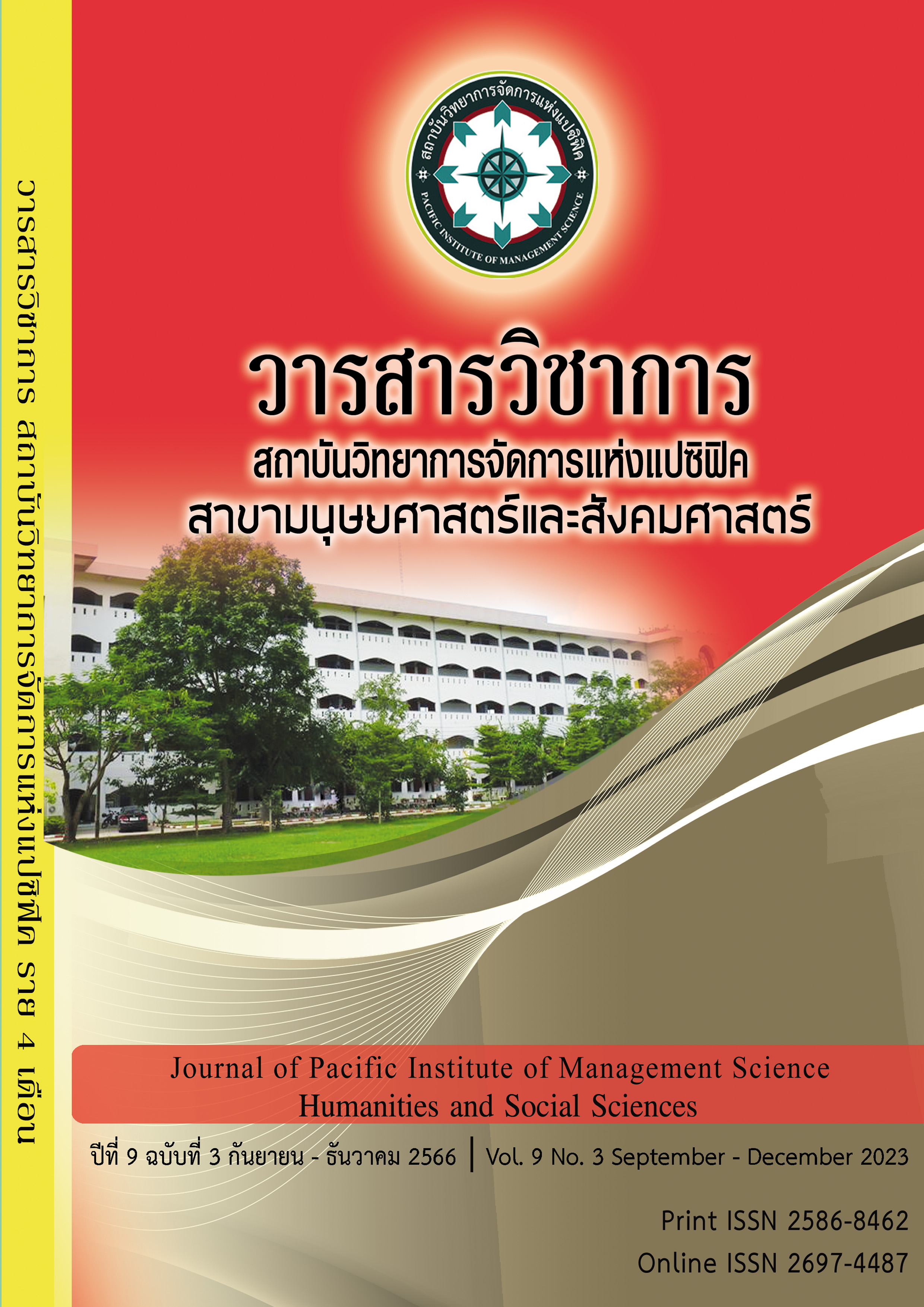Reflective Coaching Supervision to Develop English Language Teaching for Communication For Teachers in Secondary Schools
Keywords:
Reflective Coaching SupervisionAbstract
The purpose of this research was: 1) A study of Reflective Coaching Supervision. To develop the teaching of English for communication For secondary school teachers in the academic year 2022, in the area of preparing classroom-level curriculum for English teachers. Organizing learning activities for teachers and using questions by teachers while teaching 2) Evaluate the English language learning outcomes of students in the academic year 2022, the research instruments were a Teaching observation form, an interview form, and a classroom-level curriculum document analysis form. Collect data from observing teachers' teaching. Interviews with administrators, teachers, and students; analysis of classroom-level curriculum documents; The obtained data was analyzed according to the research problem. Summary and discussion of results Using descriptive analysis (Descriptive analysis)
The research results found that Reflective supervision As a result, teachers have a good attitude towards the curriculum, and have knowledge and understanding in applying the 2008 Basic Education Core Curriculum, especially the process of teaching English for communication. Teachers provide opportunities for students to interact with the teacher. and friends using English Teachers use teaching media (pictures, diagrams) and students are satisfied with learning at a very good level.
References
กระทรวงศึกษาธิการ. (2551). หลักสูตรแกนกลางการศึกษาขั้นพื้นฐาน พุทธศักราช 2551. กรุงเทพฯ: โรงพิมพ์ชุมนุมสหกรณ์การเกษตรแห่งประเทศไทย.
กรมวิชาการ. (2542). พระราชบัญญัติ การศึกษาแหงชาติ พ.ศ. 2542. กรุงเทพฯ : โรงพิมพ์คุรุสภา ลาดพราว.
บุญชม ศรีสะอาด. (2543). การวิจัยเบื้องตน. พิมพครั้งที่ 6. กรุงเทพฯ : สุวีริยาสาสน.
พิมพิไล ถือธรรม. (2550). คู่มือการจัดกิจกรรมการเรียนการสอนสาระการเรียนรูภาษาต่างประเทศ ชั้นมัธยมศึกษาปีที่ 6 โดยใช้ภูมิปัญญาท้องถิ่น. สารนิพนธ์ กศ.ม.(การบริหารการศึกษา). กรุงเทพฯ : บัณฑิตวิทยาลัย มหาวิทยาลัยศรีนครินทรวิโรฒ.
วรียา สุริยันยงค์. (2546). การพัฒนาชุดการสอนสำหรับเพื่อนช่วยสอนในการสอน เสริมภาษาอังกฤษเพื่อการสื่อสาร สำหรับผู้เรียนที่เรียนชั้นมัธยมศึกษาปีที่ 2. วิทยานิพนธ์.
สาวิตรี สีบุดศรี. (2563). ผลการใช้กิจกรรมการสะท้อนคิด ที่มีต่อความสามารถในการนำเสนอภาษาอังกฤษ ของนักเรียนไทยชั้นมัธยมศึกษาปีที่ 2. วิทยานิพนธ์ การศึกษามหาบัณฑิต สาขาวิทยาการทางการศึกษาและการจัดการเรียนรู้ มหาวิทยาลัยศรีนครินทรวิโรฒ. กรุงเทพมหานคร.
สำนักงานคณะกรรมการการศึกษาขั้นพื้นฐาน. (2556). หลักสูตรอบรม e-Training การนิเทศแนวใหม่ UTQ-02201. กรุงเทพฯ: จุฬาลงกรณ์มหาวิทยาลัย.
สำนักบริหารงานการมัธยมศึกษาตอนปลาย. (2553). คู่มือการนิเทศเพื่อพัฒนาคุณภาพ การจัดการศึกษา. กรุงเทพฯ: สำนักงานคณะกรรมการการศึกษาขั้นพื้นฐานกระทรวงศึกษาธิการ.
โสภณ ทองจิตร. (2553). การปฏิบัติงานตามกระบวนการนิเทศการศึกษาภายในของผู้นิเทศในสถานศึกษาในเครือข่ายบางกุ้ง จังหวัดสุราษฎร์ธานี. วิทยานิพนธ์ครุศาสตรมหาบัณฑิต. สาขาวิชาการบริหารการศึกษา บัณฑิตวิทยาลัย มหาวิทยาลัยราชภัฏสุราษฎร์ธานี.
Boud, D. and Fales, A. (1983). Reflective Learning: Key to Learning from Experience. Journal of Humanistic Psychology, 23(2), 99-117.
Briggs, T. H. and Joseph, M. J. (1952). Improving Instruction Through Supervision. New York: Macmillan.
Collin, J. (2003). Modern and Postmodern Teacher Supervision and Evaluation: Perception of Secondary School Principals and Teachers. Dissertation Abstracts International, 64(1), 33A.
Cruz, J. O. (2000). The Efficacy of the Social Work Model of Supervision for Education. Ed.D. Dissertation. University of Illinois at Urbana-Champaign.
Dana, N. F. & Silva, D. Y. (2001). Student Teachers as Researchers: Developing an Inquiry Stance Towards Teaching. in J. D. Rainer & Guyton, E. M. Research on the Effects of Teacher Education on Teacher Performance. (pp.91-104).
Gibbs, C. J. (2000). Self-efficacious Teachers: New Directions in the Reconstruction of Teacher Education. Auckland: Professorial Lecture, Auckland University of Technology.
Johns, Christopher. (2000). Becoming a Reflective Practitioner. London: Blackwell Science.
Krulatz, A. (2016). Reflective Practice in English Teacher Education: Why Active Learning is not enough. Journal of the International Society for Teachers, 2016(2), 8-21.
Moon, J. A. (2004). Handbook of Reflective and Experiential Learning: Theory & Practice. London: Routledge Falmer.
Moore, George Wyatt. (2000). The Supervision and Evaluation of High School Principals as Described by Central Office Administrators. Ph.D. Dissertation. University of Illinois at Urbana-Champaign.
Downloads
Published
Issue
Section
License
Copyright (c) 2023 Pacific Institute of Management Science

This work is licensed under a Creative Commons Attribution-NonCommercial-NoDerivatives 4.0 International License.
บทความที่ได้รับการตีพิมพ์เป็นลิขสิทธิ์ของ สถาบันวิทยาการจัดการแห่งแปซิฟิค
ข้อความที่ปรากฏในบทความแต่ละเรื่องในวารสารวิชาการเล่มนี้เป็นความคิดเห็นส่วนตัวของผู้เขียนแต่ละท่านไม่เกี่ยวข้องกับสถาบันวิทยาการจัดการแห่งแปซิฟิค และคณาจารย์ท่านอื่นๆในสถาบันฯ แต่อย่างใด ความรับผิดชอบองค์ประกอบทั้งหมดของบทความแต่ละเรื่องเป็นของผู้เขียนแต่ละท่าน หากมีความผิดพลาดใดๆ ผู้เขียนแต่ละท่านจะรับผิดชอบบทความของตนเองแต่ผู้เดียว







